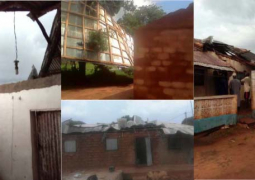We understand that Babili Mansa said the first phase of the Vision 2016 rice harvested in Jahally Pacharr would enter the market in the next two months, that is, by January 2015.
This is an indication that those producing it would have enough for their community; hence the surplus will be exported.
This is indeed commendable. Local food self-sufficiency is the most reliable and viable source of food for the people.
While the news from CRR is a good sign in the horizon, that from other regions, particularly in NBR, Nuimi District precisely, is unwelcomed.
We understand, there is a looming crop failure, including rice, in the district.
This is disheartening; after months of toiling there is nothing to harvest, which could be attributed to the insufficient rains we experienced this season.
The lesson is that we cannot rely solely on rainfall if we want to be food self-sufficient.
Yes, there are hopes that Gambia can feed herself.However, food self-sufficiency will remain farfetched if we continue to rely excessively on rainfall, which is both unreliable and erratic, especially in this age of hard-to-predict variations in the weather.
This is why is not a big surprise that rice from CRR will enter the market soon when others have their rice stock in the farms. Yes, CRR is the nucleus of rice production in The Gambia because they have fresh water for farming.
But then if other regions do not have fresh water sources, there is an alternative. There is abundance of underground water that can give us year-round bumper harvests.
In order to replicate the news from CRR in all the regions in the country, the issue of water availability is critical. Other issues like fertilizer, seeds-high yielding seeds, labour-saving machines and other essentials, should not be downplayed.
But without water, there is no agriculture; so we should address that issue first and foremost.
Statistics indicate that The Gambia produces less than 15% of its requirements in rice.It costs more than D1.3 billion to import the remaining balance needed in the country, according to the Gambia Bureau of Statistics. The figure is alarming.
We need to do more to retain the money spent on importing rice from elsewhere, when we have the land to produce enough for ourselves and the outside world.
“Everybody wants to support his own region and economy and farming. If we can preserve the land and if we can preserve the ocean, we all know, deep inside that we’re doing the right thing.”
Eric Ripert


